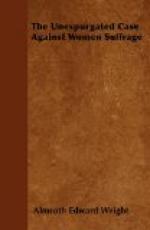And it did not appear that any other woman suffragist could discern any kind of immorality in it. The worst thing they could find to say was that it perhaps was a little gauche to confess to making a deliberately false statement on a public question when it was for the moment particularly desirable that woman should show up to best advantage before the eyes of man.
We may now for a moment put aside the question of woman’s public morality and consider a question which is inextricably mixed up with the question of the admission of woman to the suffrage. This is the mental attitude and the programme of the female legislative reformer.
IV
MENTAL OUTLOOK AND PROGRAMME OF THE FEMALE LEGISLATIVE REFORMER
The suffragist woman, when she is the kind of woman who piques herself upon her ethical impulses, will, even when she is intellectually very poorly equipped, and there is no imprint of altruism upon her life, assure you that nothing except the moral influence of woman, exerted through the legislation, which her practical mind would be capable of initiating, will ever avail to abate existing social evils, and to effect the moral redemption of the world.
It will not be amiss first to try to introduce a little clearness and order into our ideas upon those formidably difficult problems which the female legislative reformer desires to attack, and then to consider how a rational reforming mind would go to work in the matter of proposing legislation for these.
First would come those evils which result from individuals seeking advantage to themselves by the direct infliction of injury upon others. Violations of the criminal law and the various forms of sweating and fleecing one’s fellow-men come under this category.
Then would come the evils which arise out of purveying physiological and psychological refreshments and excitements, which are, according as they are indulged in temperately or intemperately, grateful and innocuous, or sources of disaster and ruin. The evils which are associated with the drink traffic and the betting industry are typical examples.
Finally, there would come into consideration the evils of death or physical suffering deliberately inflicted by man upon man with a view to preventing worse evils. The evil of war would come under this category. In this same category might also come the much lesser evil of punitive measures inflicted upon criminals. And with this might be coupled the evil of killing and inflicting physical suffering upon animals for the advantage of man.
We may now consider how the rational legislative reformer would in each case go to work.
He would not start with the assumption that it must be possible by some alteration of the law to abolish or conspicuously reduce any of the afore-mentioned evils; nor yet with the assumption that, if a particular alteration of the law would avail to bring about this result, that alteration ought necessarily to be made. He would recognise that many things which are theoretically desirable are unattainable; and that many legislative measures which could perfectly well be enforced would be barred by the fact that they would entail deplorable unintended consequences.




